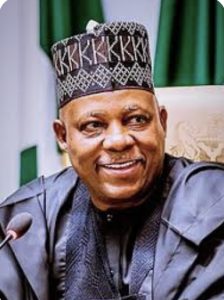Vice President Shettima Reiterates Youth’s Significance to AfCFTA at Legacy Conference
…..as MWFAAN Marks 10 Years in Nigeria

The Vice President of the federal republic of Nigeria, Kashim Shettima has reiterated the youths significance to the African Continental Free Trade Area (AfCFTA) and Agenda 2063 in driving Africa’s development
He said this during the Mandela Washington Fellowship Alumni Association of Nigeria’s Visit to the State House while marking their 10th year Anniversary in Nigeria.
The Mandela Washington Fellowship for Young African Leaders is the flagship program of the U.S. Government’s Young African Leaders Initiative (YALI) which has brought nearly 6,500 young leaders from every country in Sub-Saharan Africa to the United States for academic and leadership training.
In his welcome address, the Vice President of the Federal Republic of Nigeria, Kashim Shettima represented by the Deputy Chief of Staff Senator Ibrahim Hassan Hadejia, reiterated the significance of the African Continental Free Trade Area (AfCFTA) and Agenda 2063 in driving Africa’s development.
He emphasized the importance of youth investment for national prosperity and future development, highlighting their role in achieving local and global goals.
The Vice President commends youth organizations for their volunteerism and leadership, advocating for social justice, education, and healthcare.
The declaration aligns with Agenda 2063, aiming to transform Africa into a global commercial powerhouse by engaging youth in technology, agriculture, and creative industries.
The President also emphasized the youth’s role in shaping Africa’s future, noting that over 60% of the population is under 25.
He acknowledged the contributions of the Mandela Washington Fellowship and Nigerian organizations in fostering collaboration and leadership.
“This event aims to inspire actionable outcomes and partnerships to position Africa as a global leader in trade, technology, and sustainable development.
“There is no nation that can prosper without investing in its youth. They are the vehicles for our development projections and the change that link our policies to the future.
Some of the goals we have set, both locally and globally, are unattainable without the active involvement and energy of our youth.
“This understanding informs our agenda to not only bring the youth closer, but also to ensure that they have a seat at every table where decisions that shape the life of this nation are made. Your presence here today therefore reaffirms that this connection is mutual, and I’m deeply honored to share this moment with you a critical part of the function of this administration, and this reflects the conviction of His Excellency, President Bola Tinubu, that there can be no future without the power in the youth” he said
Emphasizing the MWFAAN’s mission, the President of the MWFAAN, Farida Yahya, said that empowering young African leaders to drive sustainable development and economic growth across the continent as well as fostering leadership skills and promoting collaborative opportunities, is MWFAAN aim to create a brighter future for Africa.
Speaking also, the Ambassador of USA to Nigeria, Richard M. Mills, Jr. represented by his Deputy Chief of Missions, David Greene highlighted the achievements of over 6,000 fellows across Africa, with 600 from Nigeria.
Mills noted Nigeria’s underrepresentation and emphasized the fellowship’s role in fostering leadership and networking.
He also highlighted significant contributions of Two notable alumni, Toyosi Ogunse and Mohammed Ibrahim,
Stressing the importance of continuous effort in driving societal transformation, he reaffirmed the U.S. Embassy’s commitment to supporting young African leaders, encouraging fellows to continue their impactful work.
One of the highpoints of the conference was the unveiling of the Ubuntu Trade App, a digital platform that allows Mandela Washington Fellows to upload their profiles to be able to trade across Africa and with U.S. partners.
The workshop sessions focused on six key thematic areas, namely the importance of open governance for Africans; freedom of press and the importance of allowing people to tell stories of Africa without the risk of being jailed; healthcare and the importance of quality healthcare and mental health across Africa; creativity and entrepreneurship; youth and trade, and women/girls and how development affects them and the challenges.
